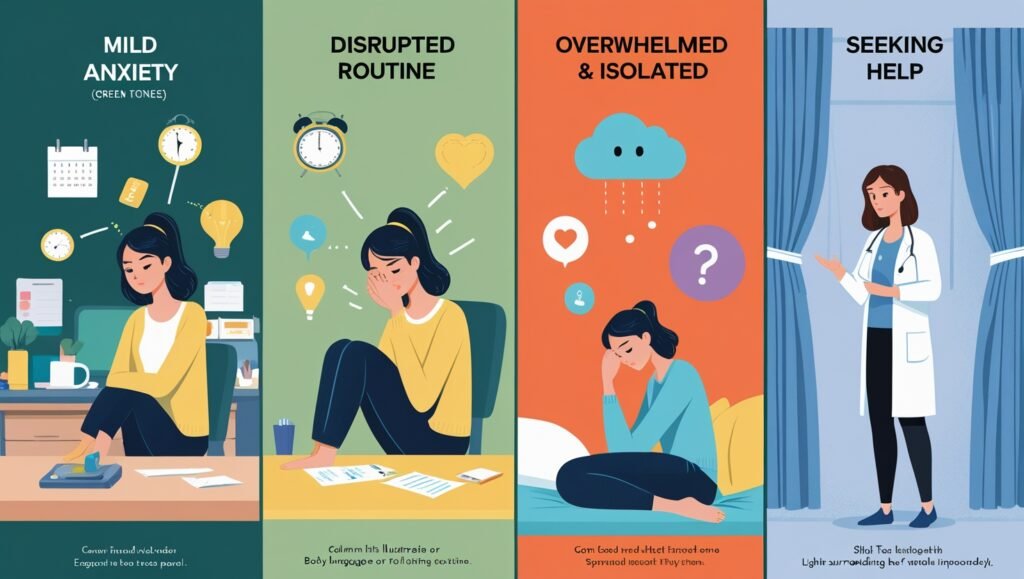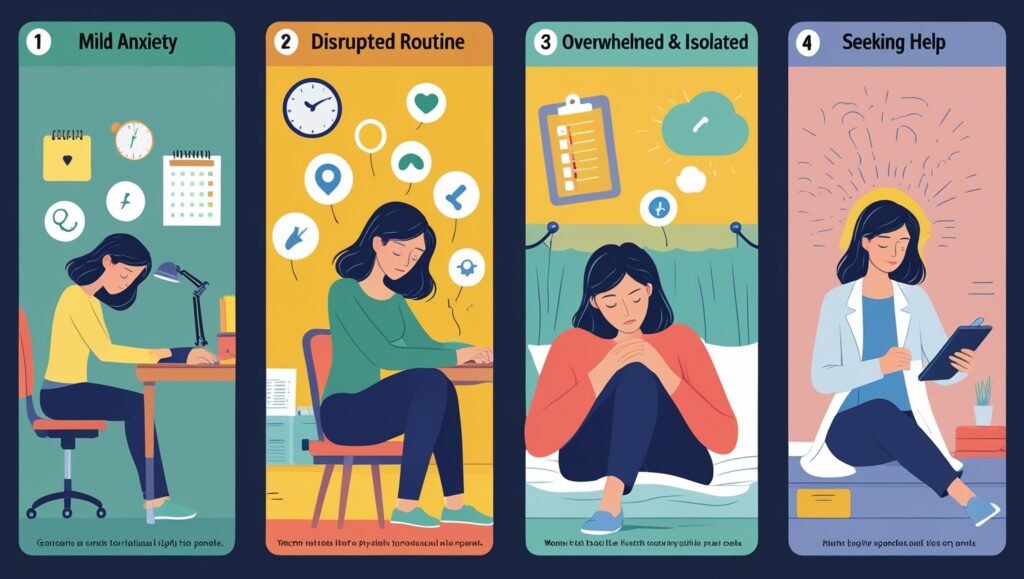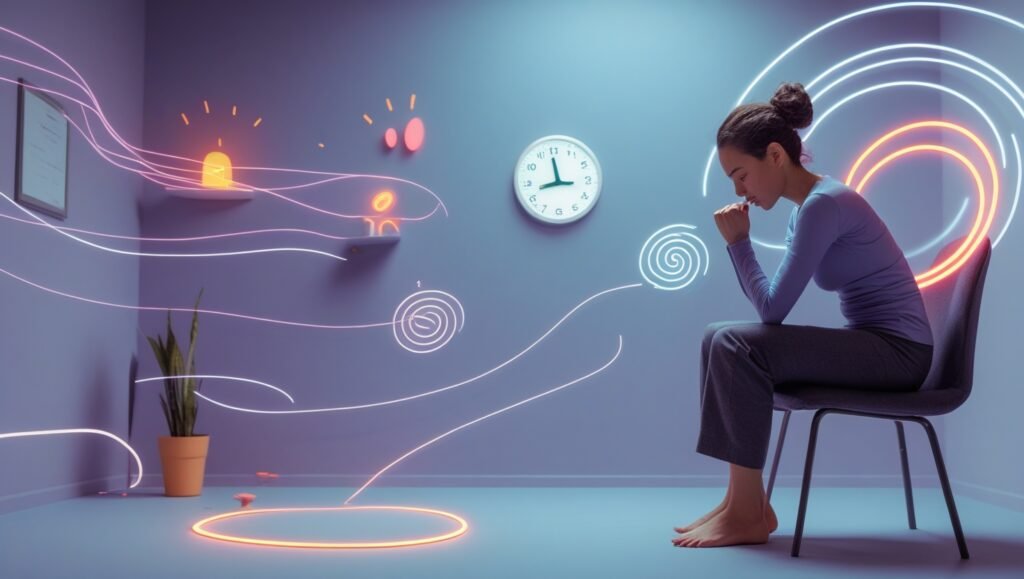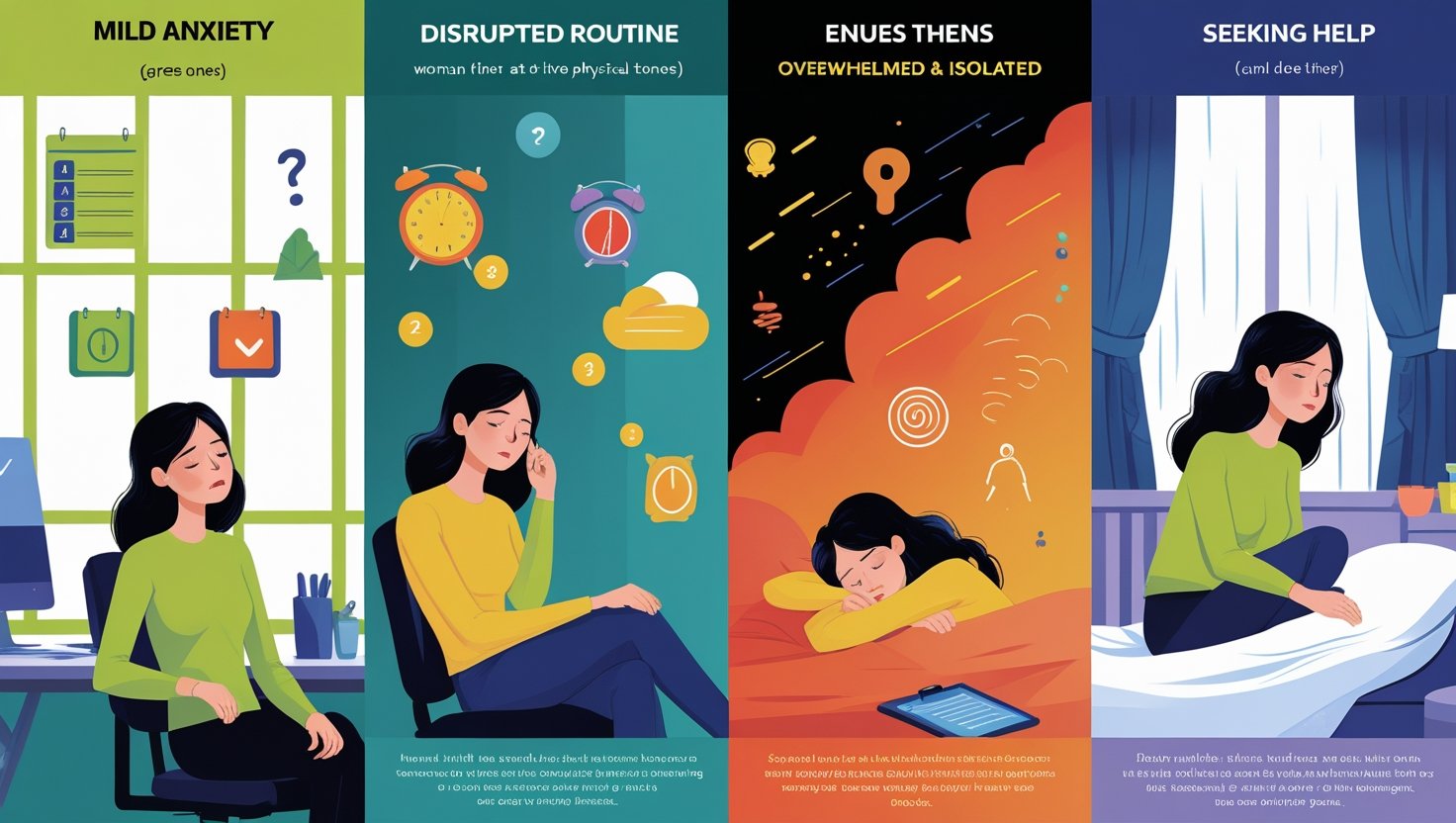Does morning anxiety mean I have an anxiety disorder now? Not necessarily. A ton of people have morning anxiety without actually having an anxiety disorder. It might happen during times of stress or life transition. “But if it’s recurring and truly disrupting your days, it’s worth speaking to a health care professional in order to see what’s happening.
When will these measures take effect? Everyone is different, but generally people start to see some improvement a week or two of using these techniques consistently. The breathing techniques and one-step-at-a-time methodology are often effective right away, whereas behaviors such as changing your bedtime routine may take longer to prove effective.
Is it medication that causes morning anxiety? Yes, there are medications that can contribute to morning anxiety, particularly when you are first starting them or changing doses. If you are concerned that your medication may be implicated, speak with your doctor. Don’t just stop taking things though without help from a doctor.
Why do we feel so much more anxious in the morning? Actually, yes. Your cortisol is going to peak in the morning naturally, and that’s what’s making people anxious – sensitive people. Also: mornings mean waking up and moving from dreamland to having to manage the demands of existing, which can be an abrupt reality check. But that’s not to say you have to accept it.
What foods can I eat for breakfast to help morning anxiety? Reach for something with protein and complex carbs to keep your blood sugar balanced. It’s usually eggs and toast or oatmeal with nuts. Skip the sugary stuff that will send your blood sugar through the roof and then crashing. And definitely eat something even if you don’t feel like it: Skipping breakfast can exacerbate anxiety.
Should I look at my phone when I wake up? I’d avoid it if possible. Going straight to emails, news or social media can provoke anxiety before you’ve had time to catch your breath for the day. Try to give yourself a good 30 minutes free of your phone when you first wake up.
How Can You Tell How Bad Your Anxiety Is?
So how do you tell if your anxiety (as fragrant and widespread as a giant fart) has crossed the already-vague line separating “normal human being stuff” from “I need more professional help”? It’s pretty simple, really. It is messing with your ability to live your life, and you’ve got a problem.
I don’t mean doing something as curable as calling in to work sick because you can’t imagine walking out the front door. Not attending parties or avoiding social events because you’re afraid you will have a panic attack. Tossing and turning at 3 a.m. with your head spinning through all the things that could potentially go wrong tomorrow. “Making the right decision should never give you anxiety, so when it does, it’s a sign it’s too big to handle yourself.

Mental health pros refer to this as an “anxiety disorder” when it reaches that level. It’s not just being a worrier — it’s when the worrying becomes so heightened and unrelenting that it interferes with your daily life. Here are the big signs to beware of:
Excessive Worrying
We’re not talking about normal worrying here. Everyone worries about stuff – will I get that promotion, is my kid doing okay in school, did I remember to lock the front door? That’s human nature.
But anxiety disorder worrying is different. It’s like your brain gets stuck on repeat, playing the same worried thoughts over and over again. You might find yourself obsessing over things that probably won’t even happen, creating these elaborate disaster scenarios in your head that feel completely real.
I had a friend who would spend hours every day worrying that her husband would die in a car accident on his way to work. Not because he was a bad driver or anything – just because her brain decided that was something to panic about. She’d track his location on her phone and call him multiple times during his commute. That’s not normal worry – that’s anxiety disorder territory.
For doctors to diagnose this, the excessive worrying usually needs to be happening more days than not for at least six months. And it has to be the kind of worry that you can’t just shake off or distract yourself from. It interferes with your ability to focus on work, enjoy time with family, or just relax and watch a movie.
Excessive Agitation
When you become anxious, your body basically believes it is in danger and goes into the fight-or-flight state. You find your heart racing, your palms sweating, your mouth drying up, and you feel kind of jittery — on edge. This is your sympathetic nervous system in action — getting you ready to fight the attacking stimulus, or to run away from it.
For one thing, this system assumes there would be a real emergency. If a bear was chasing you, all these physical adaptations would help you make it out alive. But when you’re sitting in a meeting at work or attempting to eat dinner with your family, worrying that you’re about to fight for your life isn’t very fun — or helpful.

People with anxiety disorders get stuck in this state far too frequently. Their bodies are in a perpetual state of readiness for threats that do not actually exist. It is, as well, tiring, and it doesn’t settle down fast either. So say you feel tense and edgy for hours after something mildly bad happens, like receiving a terser than normal email from your boss; or that even though something mildly good happens, like the arrival of a friend you were looking forward to seeing, you have a feeling of detachment — thinking “I should feel good” but not feeling that way.
Your body isn’t exactly equipped to remain in a constant state of physical arousal. You end up worn down all the time, because your system is always on high alert. “When we’re reviving the whole time, it’s like revving up your car engine in the driveway 24-7 — something’s going to break down at some point,” he said.
Excessive Restlessness
You know the sensation: when you’re feeling all antsy. When you know you should stand up and stretch your legs, but even when you do, you still feel jumpy and squirmy? That is restlessness, and it’s a big red flag for anxiety disorders.
This is not simply fidgeting during a dull meeting or feeling wired after too much coffee. That would be a persistent, uncomfortable urge to move that never really goes away ― one that’s present even when you’re in situations in which you should be able to relax.

One guy said he couldn’t even wait to watch movies anymore, that he would be so antsy in the theater he’d have to take off half-way. He would walk the apartment for hours at night, unable to lie down and sleep even though he was tired. That anxiety is a real momentum killer when it comes to doing things you used to love.
It affects your mind too. You might be feeling scattered and jumpy in your thoughts, which will make concentrating on anything for too long difficult. You’d likely begin several different initiatives and never see any of them through to completion, as you are unable to stop and see anything through to its end.
Poor Concentration
This really will do people’s head in – when anxiety does a number on your thoughts. Some 90% of people with anxiety disorders have difficulty focusing, and it can be so maddening when you feel as if you can’t trust your own brain.
It’s as if I have a browser opened with 47 tabs, and most of them are playing those alarmist, anxiety-inducing videos on full blast. How can you concentrate even on the freaking spreadsheet in front of you when part of your brain is preoccupied with mentally catastrophizing about that strange look your boss shot you this morning?

Anxiety messes with your working memory — the part of your brain that keeps information in your head while you’re using it. So you’d read the same paragraph five times and still not know what it said. Or you’ll be in a meeting and suddenly take notice you’ve been going for ten minutes and haven’t heard a damn word anyone’s said because you’re too busy worrying about something utterly divorced from this.
Not only is this embarrassing — it can seriously undermine your performance at work or at school. Anxious students often know the material, but bomb tests because they can’t access what they’ve learned due to their anxiety. Workers will be more apt to overlook critical details in emails or mess up on work they’d typically do blindfolded.
Excessive Irritability
When you’re anxious all the time, not much is required to push your button. Things that you normally wouldn’t notice, let alone be bothered by – the sound of someone eating too loudly, the person taking too long at the grocery store checkout – now feel like mass provocations.
This is because anxiety keeps your nervous system primed and ready to respond. It’s as if your emotion thermostat is turned up much too high, so you go from zero to furious over meaningless things. You may yell at your partner for leaving dirty dishes in the sink, or feel road rage because this guy in front of you won’t go faster than the speed limit.
And the worst part is that this irritability very often cannot even be rational to you. You get angry, and you’re like, “Wait, why am I so mad about that? This is stupid.” But knowing the feeling is irrational doesn’t make it go away.
This can really hurt your relationships. Your family and friends may begin to tiptoe around you, uncertain about what will provoke you next. You might begin to avoid social situations and become afraid you’ll snap and embarrass yourself.
Difficulty Sleeping
Anxiety and sleep issues go together like peanut butter and jelly — but nowhere near as delicious. The relationship goes both ways: Anxiety makes sleep difficult, and poor sleep encourages anxiety. It’s a vicious cycle that can be difficult to break.
Perhaps you spend hours in bed with your mind racing while replaying the day’s events or dreading tomorrow. Or you manage to fall asleep and wake up at 3am with your heart racing while you lie there thinking about all the ways your presentation will go horribly wrong next week.
Others start their days hours too early and are unable to fall back asleep as their brains are already crowded with anxiety-laden thoughts. Others sleep the whole night through, but wake as if they didn’t sleep at all, perhaps because their dreams took place in an atmosphere of anxiety and desperation.
When you don’t sleep well, everything is harder. When you’re tired, you have less emotional resilience, so stuff that you might have previously been able to let roll off your back feels overwhelming. You’re even less able to focus, you’re more irritable, and you’d more likely catastrophize over small issues.
Frequent Panic Attacks
Panic attacks are like anxiety’s evil older brother – they’re intense, scary, and can completely derail your day. If you’ve never had one, imagine the most terrified you’ve ever been, then multiply that by ten and add a bunch of physical symptoms that make you think you’re dying.
During a panic attack, your heart feels like it’s going to beat right out of your chest. You can’t catch your breath, you’re sweating, shaking, and feeling nauseous all at once. Many people describe feeling like they’re having a heart attack or going crazy. The whole thing usually peaks within a few minutes, but those minutes feel like hours.
One panic attack doesn’t necessarily mean you have an anxiety disorder – they can happen to anyone during extremely stressful situations. But if you’re having them regularly, or if you’re constantly worried about having another one, that’s when it becomes a real problem.
The fear of having a panic attack can be almost as bad as the attacks themselves. You might start avoiding places where you’ve had them before, or situations where you feel like you couldn’t escape if you needed to. This can really limit your life and make your world feel smaller and smaller.
Avoidance of Social Situations
Social anxiety is when other people feel genuinely frightening instead of just a little uncomfortable. Not just a little shy or introverted – so paralyzed by fear of other people that you stay away from them.
Dirty little secret that may be driving you There is joy in the little things, a full glass of crisp, white wine, a long run sunset, a silky nighty, or maybe black flannel onesie, you tell me. You never know when you’ll feel smitten enough to stop being that girl and start being the one who’s there and totally happy, right? You may be afraid to speak up in meetings because, in your mind, everyone will hear your voice shaking. Or you shun parties because you’re convinced no one will want to speak to you.
The physical symptoms compound everything. When you do find yourself in social situations, you may flush, sweat, shake or feel like your voice is quavering. These visible manifestations of your anxiety can be seriously embarrassing, and it means you’ll be even more prone to steering clear of social situations when they come your way.
This kind of avoidance can be quite painful for your quality of life. You may decline job offers that require public speaking, avoid dating or give up socializing with friends. Your world becomes smaller and smaller, and you miss opportunities to have experiences and develop relationships that can bring you joy.
Can Anxiety Be Dangerous?
The short answer? Yeah, anxiety can definitely kill you if you don’t get it handled. Many people think of anxiety as being something akin to a worrier or feeling stressed out, but untreated anxiety disorders can really screw your physical as well as emotional well-being.
I’m not trying to be scary, but it’s crucial to realize that anxiety is not simply a nuisance you’re doomed to live with. If you spend long enough ignoring it, it can cause real, serious health problems. The good news is that all of these issues can be completely prevented with appropriate treatment.
Experiencing the Immediate Effects of a Panic Attack
Panic attacks are more than scary; they can be physically dangerous as well, especially when they occur at inopportune moments. The symptoms themselves can be so severe that they have the potential to impact your ability to go about your day normally, or to make safe choices.
Your heart rate may accelerate to 150–200 beats per minute during a panic attack. Your blood pressure skyrockets, you might develop terrible headaches, and breathing becomes vitally hard. Others hyperventilate so severely that they faint. You may feel sick to your stomach, dizzy or as though your muscles are cramping.
Now imagine having one of these episodes while you are driving on the highway, or using a piece of heavy machinery on the job, or watching your children play on the playground. When these symptoms hit like a ton of bricks, it’s so easy to be unsafe and so difficult to make good decisions.
The hyperventilation thing it does on its own is also an issue. Breathe too fast and you blow off too much carbon dioxide, which messes with your blood chemistry. This can lead to tingling in your hands and feet, muscle cramps, and, in the worst cases, passing out. If you pass out at an inopportune moment — say, when you’re driving or walking down stairs — you could seriously injure yourself.
Raises the Possibility of a Heart Attack
Here’s something that will really get their attention: anxiety can actually raise your risk of developing heart problems. All that stress, all that physiological arousal, it simply takes a toll after a while on one’s cardiovascular system.
When you’re in a near-constant state of stress, your body is pumping out stress hormones such as cortisol and adrenaline. Your heart rate remains elevated, your blood pressure remains high, and, there’s chronic inflammation coursing through your entire body. It’s as if you were sending your cardiovascular system to the gym, without the benefit of any of the actual exercise.
If you already have heart disease, anxiety makes things even riskier yet. Research finds that people who have both anxiety and heart disease are twice as likely to suffer a heart attack as those who have heart disease alone. It could be the extra burden anxiety places on your heart that is the straw(s) that breaks the camel’s back.
The symptoms of panic attacks so closely mirror those of heart attacks that it can be genuinely difficult to know the difference. Chest pain, racing heart, shortness of breath, feeling like you’re going to die — these are symptoms of each condition. This can be dangerous in either direction: People with heart attacks might ignore their symptoms and think they are anxious, while people with panic attacks might conclude that they are dying and go to the ER.
Possibility of Substance Abuse
This is where things can go really south really quickly. In the face of anxiety that feels crushing and out of control, you reach for whatever relief you can get your hands on. Lots of people self-medicate with alcohol or drugs, which of course just adds a whole new layer of issues.
Alcohol becomes the go-to because it is legal, accessible and does afford some temporary relief from anxiety symptoms. A drink or two can slow your racing thoughts and allow you to relax. The trouble is, alcohol is a depressant, and when it wears off, your anxiety tends to come back even worse than before.
What begins as having one glass of wine to de-stress after a hard day can become needing a few drinks in order to cope. Next thing you know, you’re hooked on alcohol to control your anxiety, and then you have two problems instead of one.
There can be just as much risk with prescription drugs. Benzodiazepines, such as Xanax or Ativan, can be extremely effective for short-term anxiety relief, but are highly addictive. Some begin to take more than advised, or to take them more frequently than they’re meant to, and develop a serious addiction problem.
Anxiety in combination with substance abuse can be especially deadly. It is more difficult to treat, the outcomes are worse and it dramatically raises the risk of suicide. People who have both those issues are often caught in a cycle, using substances to tamp down anxiety, then feeling more anxious because they are using substances, so they use more substances, and so on and so forth.
When Does Anxiety Become a Concern?
So when should you actually pick up the phone and call a psychiatrist? The basic rule is this: when anxiety starts interfering with your ability to live your life the way you want to live it, it’s time to get help.
That might mean you’re calling in sick to work more often because you can’t handle leaving the house. Or you’re turning down social invitations because you’re afraid of having a panic attack. Maybe you’re lying awake every night worrying about things that haven’t happened and probably never will.
The key thing is functional impairment. Can you do your job effectively? Can you maintain relationships with friends and family? Can you take care of basic tasks like grocery shopping, paying bills, or keeping your living space clean? If anxiety is making any of these things significantly harder, that’s a concern.
You also don’t have to wait until you’re completely falling apart to seek help. If you’re just tired of feeling anxious all the time, that’s reason enough. If you’re spending hours every day worrying about things you can’t control, or if physical symptoms like headaches or stomach problems are affecting your quality of life, those are valid reasons to see a professional.
Duration matters too. Everyone goes through stressful periods where anxiety levels are higher than normal. But if you’ve been dealing with significant anxiety symptoms for more than a couple of weeks, especially if there’s no clear external cause, it’s worth getting evaluated.
Trust your gut. If your anxiety feels bigger than you can handle on your own, it probably is. There’s no shame in asking for help, and you don’t have to suffer in silence. Mental health professionals are there to help you figure out what’s going on and develop strategies that actually work.
The bottom line is this: you deserve to feel good. You deserve to be able to enjoy your life without constantly feeling on edge or worried about everything that could go wrong. If anxiety is getting in the way of that, there are people who can help you get back to feeling like yourself again.
Getting help for anxiety isn’t a sign of weakness – it’s a sign that you value your mental health and quality of life enough to do something about it. And honestly, that takes more courage than just suffering in silence and hoping things will get better on their own.
